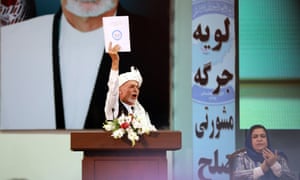Trusting The Taliban
"We are going to release them. That’s not an issue. But it has to be two-way. If we take this bold step, releasing all these guys, all these bad people, why are the Taliban not releasing our captives, which is a very small number?" "I think it’s time for the Taliban to realize that there will be no concession anymore. Whatever we have done so far as the Afghan government and the peace process, that should be enough for the Taliban to come to the negotiation table." Sediq Sediqqi, Afghanistan government spokesman
/cloudfront-us-east-1.images.arcpublishing.com/mco/QH4A2LXEMVAOTKP3JOG6Z47BSE.jpg) |
| Taliban prisoners are released from Pul-e-Charkhi jail in Kabul, Afghanistan, Thursday, Aug. 13, 2020. (Afghanistan's National Security Council via AP) |
 |
| President Ashraf Ghani, Loya Jirga’s decision. Photo: Jawad Jalali/EPA |
"The Jirga approves the release of four hundred Taliban prisoners in order to remove obstacles to the start of peace talks and stop the bloodshed." "[Following the release of the prisoners], direct negotiations [should be] initiated immediately without any excuse." "The Jirga also calls on the Taliban to fulfill their obligation to release all civilians and military prisoners and release them immediately." "The relevant sides have the goal of releasing all the remaining prisoners over the course of the subsequent three months. The United States commits to completing this goal." Loya Jirga, resolution, Kabul
The initial release of the first batch of the final 400 Taliban prisoners agreed by the Afghan government's loya jirga, to pave the way for negotiations for peace between the Taliban and the government of President Ashraf Ghani has taken place. The agreement proceedings themselves have been negotiated by the United States on behalf of Afghanistan. The Taliban had steadfastly refused to meet directly with the government, considering it a tool of the U.S.
One of the conditions the Taliban insisted upon before it commit to talks between itself and the government is that all U.S. and foreign troops be removed from Afghanistan before talks would commence. Which is exactly what the U.S. anticipates and has been working toward; releasing itself from the responsibility of fighting Afghanistan's war against the Taliban. The Afghanistan military and police have been in training by Western forces for years to make them battle-ready to protect the country on their own, to fairly mixed results.
Now, with the democratically elected government in place and the U.S. prepared to leave, Afghanistan and its people will be left to the mercy of the Taliban, a rabid fundamentalist Islamist group given to explosive-vest suicide bombings and car bombings, completely committed to restoring its reign of terror in Islamist ideology effectively returning the population to a life of bondage to their version of fascist-spectrum Islam. Any agreements reached between the government and the Taliban will be a temporary smoke screen.
Nothing will satisfy the Taliban, no sharing of government, no acknowledgement that it can be trusted to rule in the best interests of the Afghan people, that it will abandon its stern, uncompromising hard-core sharia in favour of moving toward a humane, people-centric form of governance -- for this is not within the nature of the Taliban whose devotion to Salafist interpretation of Islam is sacred to them. Where women will be forced to return to being burqa-clad, never venturing outside the home.
"The government ... yesterday released 80 Taliban convicts out of the 400 that the Consultative Loya Jirga sanctioned for release to speed up efforts for direct talks and a lasting, nationwide ceasefire", announced Javid Faisal, spokesman for the National Security Council. It's difficult to credit that government leaders place any trust in the word given them by the Taliban. Who, throughout the time they were in bargaining sessions with the U.S. continued to send out lethal bombing missions against Afghan civilian targets.
U.S. troops have steadily removed themselves from bases leading toward ending the U.S. military involvement in Afghanistan. It is anticipated that by November fewer than five thousand troops will be left in Afghanistan, substantially decreased from the close to 13,000 that were installed at the time the U.S.-Taliban agreement had been signed at the end of February.
An agreement revolving around how Afghanistan could be governed jointly and how the Taliban could share power will certainly be time-consuming and difficult to conclude. But whatever the two sides agree upon, only one side will be sincere in its efforts to satisfy the demands of the other, while the opposing side will be intently focused on appearing to submit to a mutual agreement, preparing to abrogate it at the earliest possible moment.

Labels: Afghan Women, Afghanistan, Agreement, Human Rights, Taliban, United States

<< Home